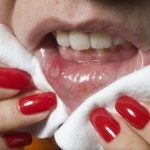
Recurrent aphthous stomatitis (RAS), is one of the most common oral mucosal diseases. Minor RAS is the most common form of the disease. The exact cause of RAS is still unknown and genetics, vitamin deficiencies, trauma, and immune dysfunction have been cited as possible causes. The aim of this study was to see whether a daily multivitamin supplement had any effect on the incidence and duration of RAS episodes over a 12-month period.
What did they do
160 adults who had a validated history of at least three episodes of idiopathic minor RAS within the previous 12 months were randomised to receive either , a once-daily multivitamin containing 100 percent of the U.S. reference daily intake (RDI) of essential vitamins (n = 83), or a once-daily placebo for up to 365 days (n = 77)
The study protocol is available on line
What did they find
There was no significant difference in the mean number of new RAS episodes between the two groups
[table id=29 /]
There were also no difference in relation to mouth pain, normalcy of diet or compliance with the study medication regimen.
They concluded
Daily multivitamin supplementation, with the RDI of essential vitamins, did not result in a reduction in the number or duration of RAS episodes. Clinicians should not recommend multi-vitamin supplementation routinely as prophylaxis for RAS
Lalla RV, Choquette LE, Feinn RS, Zawistowski H, Latortue MC, Kelly ET, Baccaglini L. Multivitamin therapy for recurrent aphthous stomatitis: A randomized, double-masked, placebo-controlled trial. J Am Dent Assoc. 2012 Apr;143(4):370-6. PubMed PMID: 22467697.
Comment
Only the abstract of this study was available to the Elf for assessment but we have previously reported on a previous publication from this study which found that stress may be involved in the initiation of new RAS episodes. The study ran for one year and not all 160 completed the trial with a total drop out of just under 30% which may have an impact on the findings.
For more information on vitamins and health visit NHS Choices

[…] Daily multivitamins did not reduce risk of mouth ulcers […]